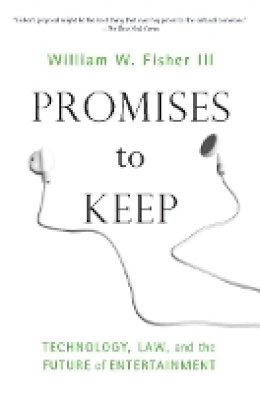William W. Fisher III is the Hale and Dorr Professor of Intellectual Property Law and Director of the Berkman Center for Internet and Society at Harvard Law School.
"Digital technologies have given society an extraordinary cultural potential. If that potential is to be made real, we must reconcile it with the legitimate and important claims of copyright. In this beautifully written and careful work, Fisher, more completely than anyone else, maps the choices that we might make. He argues for a choice that would produce enormous social good. And while not everyone will agree with the conclusions he draws, no one who cares seriously about creators or culture can ignore the framework that he has set. There are choices that we as a society must make. And as Rawls did in political theory, or Milton Friedman did in economics, Fisher provides an understanding that will color policy analysis for the generations to come."—Lawrence Lessig, Stanford Law School "The strength of this book is Fisher's willingness to step above the political fray to solve problems. He has produced one of the most important books in media studies and law in some years. It is refreshing, bold, and provocative. We need it badly." —Siva Vaidhyanathan, Director of Communication Studies, Department of Culture and Communication, New York University "This book provides the first comprehensive, accessible overview of the conflict surrounding music distribution and the emergence of digital communications networks, working towards a detailed proposal for how we could radically transform the way in which our society funds its music and film industries."—Yochai Benkler, Yale Law School "Fisher's proposal might be the best thing that ever happened to the cultural commons: the creators would be paid, while every individual would have unlimited access to every cultural creation." —The New York Times (January 25, 2004) "Harvard University Professor Terry Fisher has completed the first comprehensive examination of various alternative [compensation] models....Our thanks to Professor Fisher for his exhaustive research in making our choices clear."—The Register (February 1, 2004) "Promises to Keep is an intelligent call for reform in the entertainment industry's intellectual property business. . . . For those not fortunate enough to have taken Fisher's class on intellectual property at Harvard, this book is the next best thing. Perhaps better. Reading it is like joining him on an imaginary drive south along California's coastal highway from Silicon Valley to Hollywood. The destination is provocative, and the journey itself is spectacular and edifying."—Legal Times "...Fisher adds an important dimension to the history of plea bargaining precisely because he looks at it with a prosecutor's eye."—Michigan Law Review "Those who care about the future of the entertainment industry will find that time spent reading the book will be well-rewarded and—because it is so well-written—pleasurable, even if readers don't agree with the book's conclusions."—Entertainment Law Reporter "The most interesting aspect of the book is that it brings to the surface the very practical side of the copyright issue involving business considerations in the solutions it proposes."—Law and Politics Book Review “Fisher offers a unique perspective on a growing problem of how to capture the benefits of digital distribution while avoiding the inevitable legal implications that such dissemination ultimately raises.”—Columbia Journal of Law & the Arts

